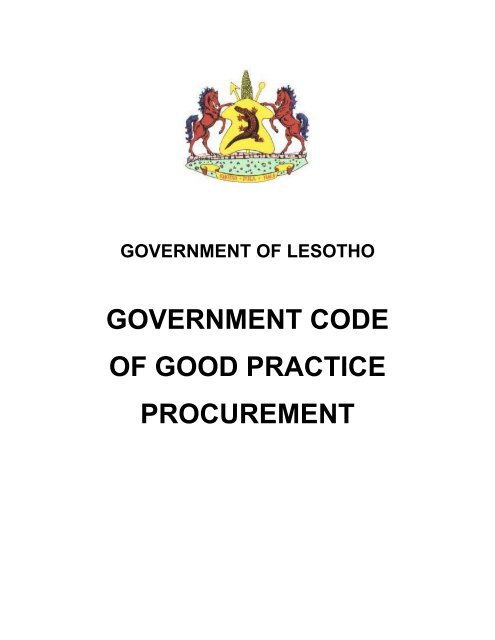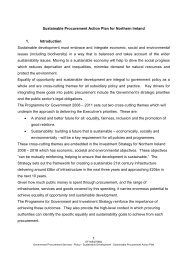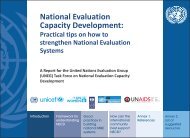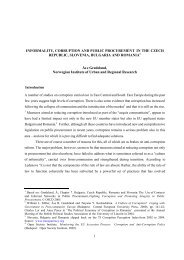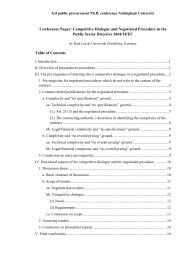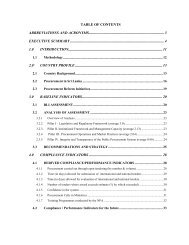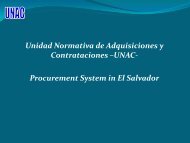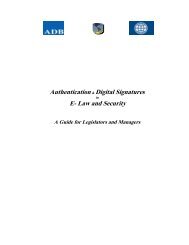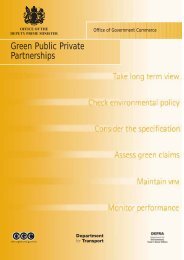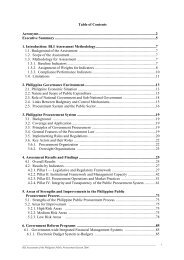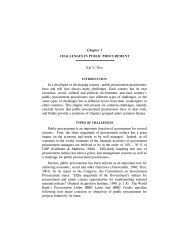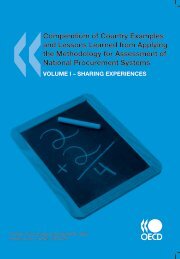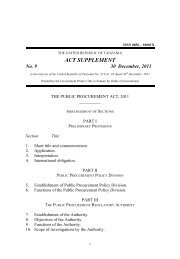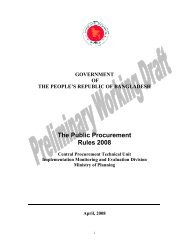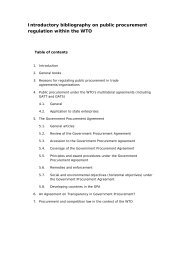government code of good practice procurement - unpcdc
government code of good practice procurement - unpcdc
government code of good practice procurement - unpcdc
You also want an ePaper? Increase the reach of your titles
YUMPU automatically turns print PDFs into web optimized ePapers that Google loves.
GOVERNMENT OF LESOTHOGOVERNMENT CODEOF GOOD PRACTICEPROCUREMENT
November 2006Introduction to the CodeWhat is the Code?The Government Code <strong>of</strong> Good Practice Procurement sets out the core values andbehaviour for all members <strong>of</strong> the <strong>government</strong>’s supply chain: both <strong>government</strong>organisations and their suppliers.¹ It is a <strong>code</strong> <strong>of</strong> conduct for all members <strong>of</strong> the supplychain which encourages all participants to work together openly and co-operatively.It also represents a commitment that <strong>government</strong> is serious about wanting to be bettercustomers and that the business sector is serious about wanting to be bettersuppliers. The Code has been developed jointly by the Ministry <strong>of</strong> Finance andDevelopment Planning and the Chambers <strong>of</strong> Commerce in Lesotho.The Code is not intended to have legal effect although it is consistent with the PublicProcurement Regulations 2006 and <strong>procurement</strong> policy guidelines as set out in theLesotho Procurement Manual.Why have a Code?Suppliers play an important role in delivering <strong>government</strong>’s core business throughoutthe Kingdom. They contribute to the <strong>government</strong>’s aim <strong>of</strong> providing high quality,efficient, responsive and services for the public. Therefore, the way in which<strong>government</strong> and suppliers throughout the chain work together and the relationshipswhich are developed are critical. By establishing a Code <strong>of</strong> Good Practice for thewhole supply chain, it is hoped that members <strong>of</strong> the chain can jointly achieve:the creation <strong>of</strong> true and effective partnering relationshipsmore successful deliveryreduced <strong>procurement</strong> timescalesa reduction in the costs <strong>of</strong> competing for <strong>government</strong> businessbetter value for money.
¹ Throughout the document, the term ‘Supplier’ is taken to mean both the immediate supplier to thecustomer and any sub-contracts or contracted third partiesIt is a <strong>code</strong> <strong>of</strong> conduct for all members <strong>of</strong> the supplychain which encourages all participants to worktogether openly and co-operativelyWho does the Code apply to?The Code is intended for all those in <strong>government</strong> supply chains, including <strong>government</strong><strong>procurement</strong> staff, contract and project managers whether in central Ministries, theDistricts or state-owned enterprises, and to supplier and sub-contractor managers andstaff. As a statement <strong>of</strong> <strong>good</strong> <strong>practice</strong> it should be shared openly between the existingand potential members <strong>of</strong> the supply chain. The Procurement Policy and AdviceDivision (PPAD) <strong>of</strong> the Ministry <strong>of</strong> Finance and Development Planning andrepresentative bodies such as the Chambers <strong>of</strong> Commerce will promote the adoption<strong>of</strong> the Code as widely as possible.What if one party does not follow the Code?It is hoped that all members <strong>of</strong> the supply chain will see the mutual benefits <strong>of</strong>following the <strong>practice</strong>s set out in this Code, and will attempt to resolve any complianceissues locally. Where this is not possible, and where one party in a relationshipbelieves the other to be in breach <strong>of</strong> the Code, they are advised to bring this to theattention <strong>of</strong> PPAD or the relevant representative body as appropriate.Who can you contact about the Code?If you have an enquiry about the Code or its implementation on specificcontracts/projects, you should contact the Head <strong>of</strong> Procurement in the <strong>government</strong>organisation you are dealing with, the relevant representative body or PPAD.
When working within <strong>government</strong>, all customers, suppliers and their suppliersthroughout the supply chain shall commit themselves to these core values:fairnesshonesty and opennessefficiency and effectivenesspr<strong>of</strong>essionalism1. FairnessThe members <strong>of</strong> the supply chain will act fairly during thecompetitive process and throughout the business relationship. Theywill do this by:Jointly1.1 Managing and participating incompetitions in a fair manner.1.2 Providing accurate and timelyinformation, in appropriatedetail.1.3 Respecting the confidentiality <strong>of</strong>third parties and members <strong>of</strong>the supply chain, particularlywhere some information maybe covered by intellectualproperty rights or represent asupplier’s specific commercialadvantage.1.4 Understanding the need for<strong>government</strong> organisations tocomply with the regulations andpolicy guidelines, and theirobjective <strong>of</strong> developing Basothobusiness so that they areencouraged to tender forappropriate work either directlyor in conjunction with others.Customers1.5 Being objective, even-handedand transparent when makingdecisions and making sure thateach competition is run withoutfavouring any one supplier.1.6 Applying Lesotho domesticpolicy and meeting internationalobligations.1.7 Ensuring genuine competitionby selecting the appropriatenumber <strong>of</strong> tenders, taking into
account the legal requirement,Suppliersand seeking to reduce1.8 Striving to ensure thatunnecessary costs (to thecustomers continue to obtaincustomer and potentialbusiness benefit in allsuppliers) by restrictingrelationships with suppliers.competitions to a reasonablesize.2. Honesty and opennessThe members <strong>of</strong> the supply chain will be honest and open whenconducting business with each other. They will do this by:the appropriate allocation andJointlymanagement <strong>of</strong> risk.2.1 Working together to manage2.5 Raising any issues <strong>of</strong> concernexpectations.at an early stage so as to2.2 Advising each other <strong>of</strong> anysignificant reservations aboutenableresolution.constructive jointrequirements and assumptions2.6 Being open about any interestin a constructive fashion at anythey may have which may havetime during the contract/project,a bearing on the relationship.and being genuinely receptive<strong>of</strong> that advice.2.3 Working together to ensure thatpricing structures are aimed atrealising and demonstratingvalue for money for thecustomer and a reasonablereturn for the supplier.2.4 Sharing views <strong>of</strong> risk andcontingency plans for<strong>procurement</strong> and contractperformance, and working toachieve a realistic position on2.7 Dealing with each other in <strong>good</strong>faith about their capabilities,skills, products and resources,and their respective strengthsand limitations throughout therelationship.Customers2.8 Sharing plans with potentialsuppliers at as early a stage aspossible, consulting with andlistening to the observations <strong>of</strong>
those suppliers. Reflectingthose observations in theplanned approach whereappropriate and explainingwhere this is not possible.2.9 Indicating clearly when invitingsuppliers to tender how their<strong>of</strong>fers will be evaluated andstating the relative priorities <strong>of</strong>the selection and award criteria.2.10 Making sure that formalcompetitions are launched onlywhen there is a clear intent toaward a contract. Doing sowithin published timescales,where appropriate advisingpotential suppliers <strong>of</strong> thedegree to which this may besubject to subsequent politicaldecisions or changinginvestment priorities.Suppliers2.13 Being open about their aims,objectives, strategies andbusiness alliances as theyrelate to <strong>government</strong> business.2.14 Making clear any assumptions,dependencies and/or risks onthe customer which underpinthe supplier’s ability to deliverthe required <strong>good</strong>s, works orservices.2.15 Fully respecting the need forpublic sector <strong>procurement</strong>activity to be conducted, and tobe seen to be conducted, withintegrity, probity and fairness.2.11 Providing successful andunsuccessful candidates andtenderers with feedback whichis as helpful as possible anddesigned to promote futureimprovement.2.12 Making clear at the outset howthe successful supplier’sperformance will be judged andproviding regular feedbackthroughout the life <strong>of</strong> thecontract/project.
3. Efficiency and effectivenessThe members <strong>of</strong> the supply chain will contribute to improving theefficiency and effectiveness <strong>of</strong> <strong>government</strong> <strong>procurement</strong>. They willdo this by:3.3 Taking into account, as far as isJointlyreasonable, the wider business3.1 Striving for the highestgoals <strong>of</strong> the other party.standards <strong>of</strong> performance and3.4 If the need to consider orbest <strong>practice</strong>, within the contextpropose changes to the<strong>of</strong> best value for money.contract arises, doing so3.2 Seeking to mitigate disruption,constructively and indelays and additional costs,consultation with the otherhowever they may be caused.party, seeking to maintain valueIn particular, keepingfor money and to minimise theprocedures as simple asadverse impact onpossible and taking otherperformance, cost andactions as appropriate totimescale.eliminate all unnecessary costs3.5 Working to secure appropriateto both parties.business relationships
generally, including developinglonger-termcollaborative and strategic partnershipswhere such arrangements are bestsuited to deliver value for money.3.6 Meeting commitments in atimely manner and making sure,wherever possible, that published<strong>procurement</strong> and implementationtimetables are kept to.3.7 Working together to managecontracts in a way which does notduplicate resources and effort andwhich properly reflects the division <strong>of</strong>responsibilities and risks and ensuresthat all partners share commonobjectives and purpose.Customers3.8 Implementing best <strong>practice</strong> aspromulgated by <strong>government</strong>.3.9 Making sure that requirementsand outputs or benefits are specified ina way which enables suppliers topropose the best value for moneysolution, adopting innovativeapproaches where appropriate.3.10 Making sure that proposedtimetables are realistic.3.11 Where appropriate, utilisingelectronic commerce techniques toimprove the efficiency <strong>of</strong> the interfacewith suppliers and the integration <strong>of</strong>related processes.3.12 Keeping to the <strong>government</strong>’starget <strong>of</strong> 48 hours to notify suppliers ifinvoices are incorrect and 30 days forthe payment <strong>of</strong> bills.Suppliers3.13 Pursuing continuedimprovement and seeking actively toidentify, and share with the customer,experiences, innovations and marketadvances.3.14 Being proactive in thesuggestion and the use <strong>of</strong> measures toimprove the efficiency <strong>of</strong> thecontractual relationship.3.15 From the earliest possiblestages, working with any potential subcontractorsor other business partnersto promote an integrated supply chainapproach and to make most effectiveuse <strong>of</strong> skills and resources.3.16 Submitting correctly completedinvoices supported by all thecertification and other documentsrequired under the contract.
4. Pr<strong>of</strong>essionalismThe members <strong>of</strong> the supply chain will work to a high standard <strong>of</strong>pr<strong>of</strong>essionalism. They will do this by:Jointly4.1 Acting at all times withcourtesy, consideration and integrity.Encouraging pr<strong>of</strong>essional and ethicalbehaviour by staff in all their dealingsthroughout the supply chain, and bycomplying with the <strong>government</strong>’s Code<strong>of</strong> Conduct for Procurement Staff and
the <strong>code</strong>s <strong>of</strong> <strong>practice</strong> <strong>of</strong> relevantpr<strong>of</strong>essional bodies.4.2 Actively respecting people, forexample through health and safety andtraining commitments.4.3 Adequately resourcing theplanning, preparation and deliverystages <strong>of</strong> projects, fulfillingcommitments on staffing levels, skillsand competencies.4.4 Avoiding unrealistic andunnecessary changes in dates ortimescales, particularly in the eventthat requirements change. Ensuringthat key decisions are communicatedpromptly to all parties in the event thatthe programme is revised.4.5 Making sure that roles andresponsibilities are clear andunderstood.4.6 Making sure that there isadequate continuity <strong>of</strong> staff throughthewhole lifecycle <strong>of</strong> projects – before,during and after the <strong>procurement</strong>phase.4.7 Filling posts on projects withstaff who have the necessaryexperience, knowledge and expertise.4.8 Ensuring that there isappropriate management backing forprojects from the outset and untilcompletion.4.9 Working actively together tosolve problems at the earliest possiblestage and seeking to resolvecontractual disputes using alternativedisputes mechanisms whereverappropriate.4.10 Responding promptly andcourteously to communications andmaking sure that appropriate contactdetails are always given.4.11 Behaving ethically in allbusiness dealings.Customers4.12 Continuing to award work onthe basis <strong>of</strong> value for money (whole lifecost and quality) criteria and not simplythe lowest purchase price.4.13 Making sure that, whereappropriate, specifications and valuefor money award criteria includerelevant sustainability andenvironmental factors in accordancewith <strong>government</strong> legislation and/orguidance in force at the time.Suppliers4.14 Fostering high levels <strong>of</strong>pr<strong>of</strong>essional competence and beingproactive in training supplier staff toenable them to understand and
effectively deliver against agreedcustomer targets.4.15 Only proposing solutions whichthey know they can deliver, andcontinuing to behave in such a way asto maintain customers’ confidencethroughout the life <strong>of</strong> the contract.4.16 Working collaboratively with thecustomer and other parties asappropriate to ensure that the focus ismaintained ultimately on the publicinterest at all times.


